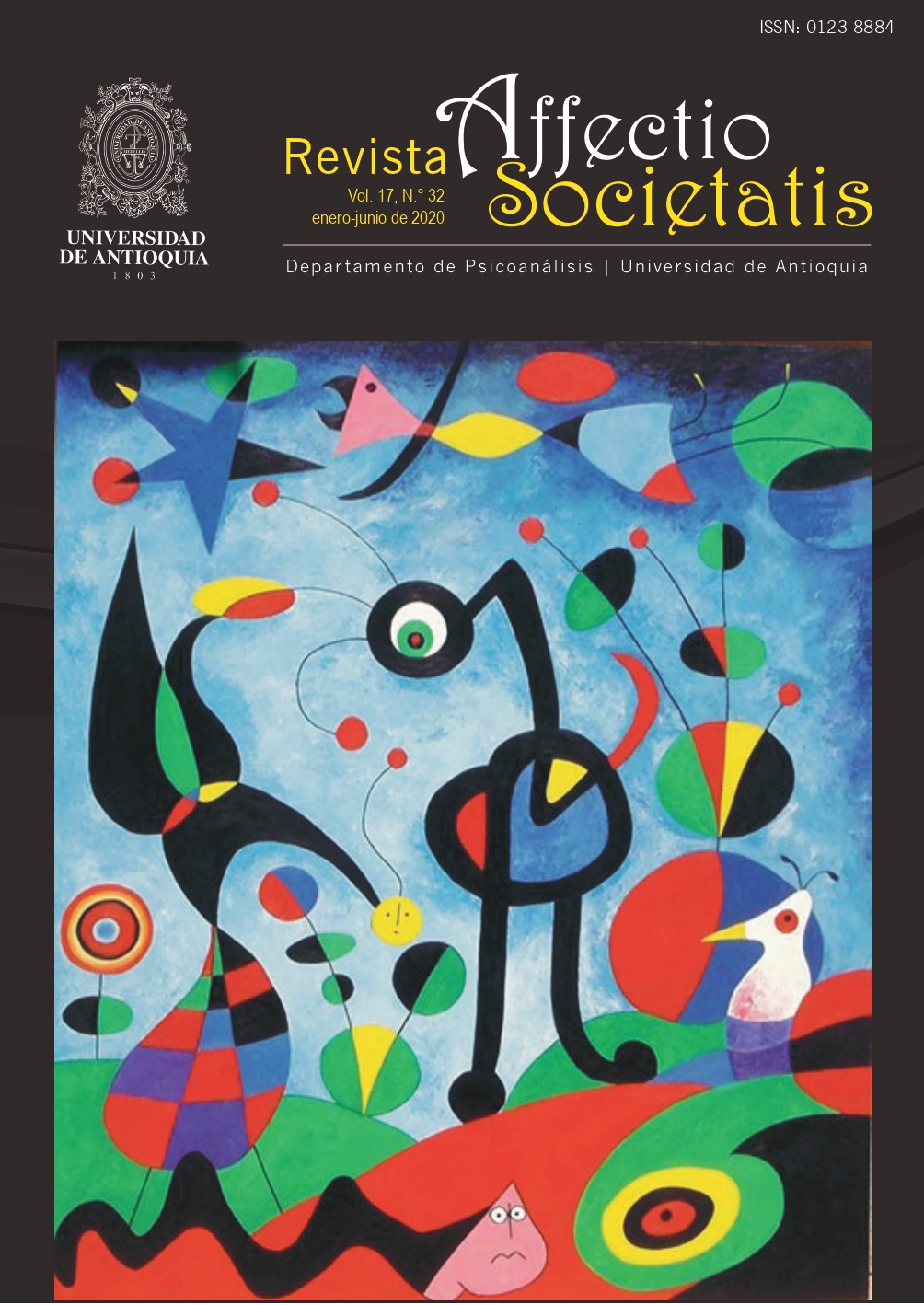Adolescencia y movimientos sociales: incidencias en la constitución del sujeto
DOI:
https://doi.org/10.17533/udea.affs.v17n32a07Palavras-chave:
movimientos sociales, adolescencia, Movimiento Ocupa Escuela, discursos sociales sobre adolescenciaResumo
Este texto abordar la operación de la adolescencia en el contexto de los movimientos sociales que tienen como característica subvertir discursos estatuidos. El trabajo de la adolescencia implica transformar lo que se ha recibido como herencia simbólica haciendo posible alguna apropiación singular de eso, incluso siempre marcada por algo de lo real que la trasciende y supera. El movimiento social que sirve de base para la discusión en el texto fue el denominado “ocupa escuela” reconocido como movimiento de las ocupaciones de escuelas por estudiantes de secundaria en Brasil entre el 2015 y el 2017 el análisis de ese movimiento es cruzado con hallazgos realizados en una investigación con adolescentes en Latinoamérica sobre nominación y cambios de nombres.
Downloads
Referências
Alberti, S. (2004). O Adolescente e o Outro. Rio de Janeiro, Brasil: Jorge Zahar.
Assoun, P-L. (1998). Leçons Psychanalytiques sur Frères et Soeurs – Tome 1: Le Lien Inconscient. Paris: Anthropos.
Bolaños, Diego. (2017). “Respiramos el mismo aire pero somos diferentes” Constitucion de subjetividad en adolescentes integrantes de agrupaciones juveniles de ciudad em Mar del Plata (Argentina) y Cali (Colombia). Tese de doutorado no Programa de Pós-Graduação em Educação/Doutorado Latino- Americano de Educação, Políticas Públicas e Profissão Docente (UFMG). Belo Horizonte, Brasil.
Calligaris, C. (2000). Adolescência. São Paulo, Brasil: Publifolha.
Campos, A; Medeiros, J; Ribeiro, M. (2016). Escolas de luta. São Paulo, Brasil: Veneta, Coleção Baderna.
Coutinho, L. (2009). Adolescência e Errância: Destinos do laço Social Contemporâneo. Rio de Janeiro: Editora Nau.
Facebook Ocupa Escola. Recuperado en: https://www.facebook.com/ocupaescola/. 20/11/ 2016.
Freud, S. (1976/1921). Psicologia de grupo e análise do ego. In: Obras Completas de Sigmund Freud (Edição Standard Brasileira). Rio de Janeiro, Brasil: Imago. vol. 13, pp.87-179.
Kehl, M. R. (2000) (org) Função fraterna. Rio de Janeiro, Brasil: Relume Dumará.
Lacadée, P. (2011). O despertar e o exílio – ensinamentos psicanalíticos da mais delicada das transições: a adolescência. Rio de Janeiro, Brasil: Contracapa.
Lacan, J. (1988/1963-64). O seminário, livro 11. Os quatro conceitos fundamentais da psicanálise. Rio de Janeiro, Brasil: Jorge Zahar.
Lacan, J. (1992/1969-70). O seminário: livro 17. O Avesso da Psicanálise. Rio de Janeiro, Brasil: Jorge Zahar.
Musati, A P; Rosa, M. D. Articulações entre psicanálise e negritude: desamparo discursivo, constituição subjetiva e traços identificatórios. Revista da ABPN . v. 10, n. 24, 89-107, nov.2017 – fev. 2018.
Poli, M. C. (2014). Clínica da Exclusão: a construção do fantasma e o sujeito adolescente. 2. edição. São Paulo, Brasil: Casa do Psicólogo.
Rosa, M. D. (2016). A Clínica Psicanalítica em Face da Dimensão Sociopolítica do Sofrimento. São Paulo, Brasil: Escuta.
Simmel, G. (1971/1957). Freedom and the individual. In: Levine, D. (ed.). On Individuality and Social Forms – Selected Writings. Chicago, The University of Chicago Press, p. 217-234.
Filmografía:
Rhoden, C. (2017). (dir.) Nunca me sonharam. Marinha Farinha Filmes, Brasil:
Downloads
Publicado
Como Citar
Edição
Seção
Licença
Copyright (c) 2020 Affectio Societatis

Este trabalho está licenciado sob uma licença Creative Commons Attribution-NonCommercial-ShareAlike 4.0 International License.
Os autores autorizam a Revista a publicar seus trabalhos acadêmicos não apenas no website da Revista, mas também em qualquer outro meio escrito ou eletrônico da Revista, bem como nos bancos de dados aos quais a Revista tem acesso. A Affectio Societatis reconhece que os direitos morais e a decisão de publicar suas obras posteriormente em outros meios de publicação pertencem exclusivamente aos autores, caso em que estes devem reconhecer expressamente os créditos devidos à Affectio Societatis.









